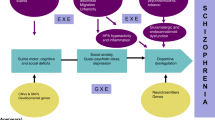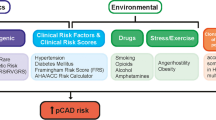A positive family history is frequently reported by patients with coronary artery disease (CAD) or myocardial infarction. For risk stratification, it is crucial to distinguish between accidental reoccurrence of sporadic cases and cases with a true heritable component of the conditions. A familial predisposition is assumed when a myocardial infarction is diagnosed by a male first degree relative before the 55th year of life or a female first degree relative before the 65th year of life. The current manuscript reviews major studies from which a familial risk of CAD or myocardial infarction can be inferred. Moreover, a brief overview summarizes the current results of molecular genetic research on chromosomal loci and genes relevant for CAD and myocardial infarction.
Similar content being viewed by others
References
Tunstall-Pedoe H, Vanuzzo D, Hobbs M, Mahonen M, Cepaitis Z, Kuulasmaa K, Keil U (2000) Estimation of contribution of changes in coronary care to improving survival, event rates, and coronary heart disease mortality across the WHO MONICA Project populations. Lancet 355:688–700
Tolonen H, Keil U, Ferrario M, Evans A (2005) Prevalence, awareness and treatment of hypercholesterolaemia in 32 populations: results from the WHO MONICA Project. Int J Epidemiol 34:181–192
Yusuf S, Hawken S, Ounpuu S, Dans T, Avezum A, Lanas F, McQueen M, Budaj A, Pais P, Varigos J, Lisheng L (2004) Effect of potentially modifiable risk factors associated with myocardial infarction in 52 countries (the INTERHEART study): case-control study. Lancet 364:937–952
McQueen MB, Bertram L, Rimm EB, Blacker D, Santangelo SL (2003) A QTL genome scan of the metabolic syndrome and its component traits. BMC Genet 4(Suppl 1):S96
Tolg R, Witt M, Schwarz B, Kurz T, Kurowski V, Hartmann F, Geist V, Richardt G (2006) Comparison of carvedilol and metoprolol in patients with acute myocardial infarction undergoing primary coronary intervention – the PASSAT Study. Clin Res Cardiol 95:31–41
Basat O, Ucak S, Seber S, Oztekin E, Altuntas Y (2006) After myocardial infarction carvedilol improves insulin resistance compared to metoprolol. Clin Res Cardiol 95:99–104
Scheuner MT (2004) Clinical application of genetic risk assessment strategies for coronary artery disease: genotypes, phenotypes, and family history. Prim Care 31:711-xii
Broeckel U, Hengstenberg C, Mayer B, Holmer S, Martin LJ, Comuzzie AG, Blangero J, Nurnberg P, Reis A, Riegger GA, Jacob HJ, Schunkert H (2002) A comprehensive linkage analysis for myocardial infarction and its related risk factors. Nat Genet 30:210–214
Frantz S, Brandes RP, Hu K, Rammelt K, Wolf J, Scheuermann H, Ertl G, Bauersachs J (2006) Left ventricular remodeling after myocardial infarction in mice with targeted deletion of the NADPH oxidase subunit gp91PHOX. Basic Res Cardiol 101:127–132
Koch KC, Schaefer WM, Liehn EA, Rammos C, Mueller D, Schroeder J, Dimassi T, Stopinski T, Weber C (2006) Effect of catheter-based transendocardial delivery of stromal cellderived factor 1alpha on left ventricular function and perfusion in a porcine model of myocardial infarction. Basic Res Cardiol 101:69–77
Gallagher G, Menzie S, Huang Y, Jackson C, Hunyor SN (2006) Regional cardiac dysfunction is associated with specific alterations in inflammatory cytokines and matrix metalloproteinases after acute myocardial infarction in sheep. Basic Res Cardiol
Schachinger V, Britten MB, Zeiher AM (2006) Diabetes mellitus and coronary artery disease-a high risk combination. Clin Res Cardiol 95 (Suppl 1):i18–i26
Motz W, Kaiser R (2006) Stent therapy with diabetic patients who have coronary artery disease. Clin Res Cardiol 95:i27–i30
Bischoff B, Silber S, Richartz BM, Pieper L, Klotsche J, Wittchen HU (2006) Inadequate medical treatment of patients with coronary artery disease by primary care physicians in Germany. Clin Res Cardiol 95:405–412
Hawe E, Talmud PJ, Miller GJ, Humphries SE (2003) Family history is a coronary heart disease risk factor in the Second Northwick Park Heart Study. Ann Hum Genet 67:97–106
Myers RH, Kiely DK, Cupples LA, KANNEL WB (1990) Parental history is an independent risk factor for coronary artery disease: the Framingham Study. Am Heart J 120:963–969
Murabito JM, Pencina MJ, Nam BH, D’Agostino RB Sr, Wang TJ, Lloyd- Jones D, Wilson PW, O’Donnell CJ (2005) Sibling cardiovascular disease as a risk factor for cardiovascular disease in middle-aged adults. JAMA 294:3117–3123
Boer JM, Feskens EJ, Verschuren WM, Seidell JC, Kromhout D (1999) The joint impact of family history of myocardial infarction and other risk factors on 12-year coronary heart disease mortality. Epidemiology 10:767–770
Horne BD, Camp NJ, Muhlestein JB, Cannon-Albright LA (2006) Identification of excess clustering of coronary heart diseases among extended pedigrees in a genealogical population database. American Heart Journal (in press)
Hengstenberg C, Holmer SR, Mayer B, Engel S, Schneider A, Lowel H, Riegger GA, Schunkert H (2001) Siblings of myocardial infarction patients are overlooked in primary prevention of cardiovascular disease. Eur Heart J 22:926–933
Andresdottir MB, Sigurdsson G, Sigvaldason H, Gudnason V (2002) Fifteen percent of myocardial infarctions and coronary revascularizations explained by family history unrelated to conventional risk factors. The Reykjavik Cohort Study. Eur Heart J 23:1655–1663
Marenberg ME, Risch N, Berkman LF, Floderus B, de Faire U (1994) Genetic susceptibility to death from coronary heart disease in a study of twins. N Engl J Med 330:1041–1046
Fischer M, Broeckel U, Holmer S, Baessler A, Hengstenberg C, Mayer B, Erdmann J, Klein G, Riegger G, Jacob HJ, Schunkert H (2005) Distinct heritable patterns of angiographic coronary artery disease in families with myocardial infarction. Circulation 111:855–862
Fischer M, Mayer B, Baessler A, Riegger G, Hengstenberg C, Schunkert H (2006) Hauptstammstenose bei Geschwistern als Prädiktor für fatale und nicht-fatale Herzinfarkte. Abstract, DGK Jahrestagung 2006, Mannheim
Schunkert H, Fischer M (2002) Old and simple tools may do better – sometimes. Eur Heart J 23:1900–1902
Werneck-de-Castro JP, Costa-E-Sousa RH, de Oliveira PF, Pinho-Ribeiro V, Mello DB, Pecanha R, Mattos E, Olivares EL, Maia AC, Mill JG, Goldenberg RC, Campos-de-Carvalho AC (2006) G-CSF does not improve systolic function in a rat model of acute myocardial infarction. Basic Res Cardiol (in press)
Beer S, Reincke M, Kral M, Lie SZ, Steinhauer S, Schmidt HH, Allolio B, Neubauer S (2002) Susceptibility to cardiac ischemia/reperfusion injury is modulated by chronic estrogen status. J Cardiovasc Pharmacol 40:420–428
Cambien F, Poirier O, Lecerf L, Evans A, Cambou JP, Arveiler D, Luc G, Bard JM, Bara L, Ricard S (1992) Deletion polymorphism in the gene for angiotensin-converting enzyme is a potent risk factor for myocardial infarction. Nature 359:641–644
Schunkert H, Hense HW, Holmer SR, Stender M, Perz S, Keil U, Lorell BH, Riegger GA (1994) Association between a deletion polymorphism of the angiotensin-converting-enzyme gene and left ventricular hypertrophy. N Engl J Med 330:1634–1638
Holmer SR, Bickeboller H, Hengstenberg C, Rohlmann F, Engel S, Lowel H, Mayer B, Erdmann J, Baier C, Klein G, Riegger GA, Schunkert H (2003) Angiotensin converting enzyme gene polymorphism and myocardial infarction a large association and linkage study. Int J Biochem Cell Biol 35:955–962
Kuznetsova T, Staessen JA, Wang JG, Gasowski J, Nikitin Y, Ryabikov A, Fagard R (2000) Antihypertensive treatment modulates the association between the D/I ACE gene polymorphism and left ventricular hypertrophy: a meta-analysis. J Hum Hypertens 14:447–454
Schunkert H (1998) Controversial association of left ventricular hypertrophy and the ACE I/D polymorphism – is the mist clearing up? Nephrol Dial Transplant 13:1109–1112
Kolovou G, Daskalova D, Mikhailidis DP (2003) Apolipoprotein E polymorphism and atherosclerosis. Angiology 54:59–71
Hansson GK (2001) Immune mechanisms in atherosclerosis. Arterioscler Thromb Vasc Biol 21:1876–1890
Chiappelli M, Tampieri C, Tumini E, Porcellini E, Caldarera CM, Nanni S, Branzi A, Lio D, Caruso M, Hoffmann E, Caruso C, Licastro F (2005) Interleukin-6 gene polymorphism is an age-dependent risk factor for myocardial infarction in men. International Journal of Immunogenetics 32:349–353
Bennet AM, van Maarle MC, Hallqvist J, Morgenstern R, Frostegard J, Wiman B, Prince JA, de Faire U (2006) Association of TNF-[alpha] serum levels and TNFA promoter polymorphisms with risk of myocardial infarction. Atherosclerosis (in press)
Holloway JW, Yang IA, Ye S (2005) Variation in the toll-like receptor 4 gene and susceptibility to myocardial infarction. Pharmacogenet Genomics 15:15–21
Lane DA, Grant PJ (2000) Role of hemostatic gene polymorphisms in venous and arterial thrombotic disease. Blood 95:1517–1532
Wang X, Ishimori N, Korstanje R, Rollins J, Paigen B (2005) Identifying novel genes for atherosclerosis through mouse-human comparative genetics. Am J Hum Genet 77:1–15
Wang L, Fan C, Topol SE, Topol EJ, Wang Q (2003) Mutation of MEF2A in an inherited disorder with features of coronary artery disease. Science 302:1578–1581
Hayashi M, Kim SW, Imanaka-Yoshida K, Yoshida T, Abel ED, Eliceiri B, Yang Y, Ulevitch RJ, Lee JD (2004) Targeted deletion of BMK1/ERK5 in adult mice perturbs vascular integrity and leads to endothelial failure. J Clin Invest 113:1138–1148
Bhagavatula MR, Fan C, Shen GQ, Cassano J, Plow EF, Topol EJ, Wang Q (2004) Transcription factor MEF2A mutations in patients with coronary artery disease. Hum Mol Genet 13:3181–3188
Gonzalez P, Garcia-Castro M, Reguero JR, Batalla A, Ordonez AG, Palop RL, Lozano I, Montes M, Alvarez V, Coto E (2005) The Pro279Leu variant in the transcription factor MEF2A is associated with myocardial infarction. J Med Genet
Weng L, Kavaslar N, Ustaszewska A, Doelle H, Schackwitz W, Hebert S, Cohen JC, McPherson R, Pennacchio LA (2005) Lack of MEF2A mutations in coronary artery disease. J Clin Invest 115:1016–1020
Mayer B, Fischer M, Erdmann J, Holmer S, Lieb W, Hubauer U, Klein G, Nürnberg G, Nürnberg P, Löwel H, Broeckel U, Jacob H, Saar K, Reis A, Hengstenberg C, Schunkert H (2002) Identification of autosomal dominant heritability of myocardial infarction. Abstract, Circulation 105(Suppl)
Assmann G, Cullen P, Schulte H (2002) Simple scoring scheme for calculating the risk of acute coronary events based on the 10-year follow-up of the prospective cardiovascular Munster (PROCAM) study. Circulation 105:310–315
Author information
Authors and Affiliations
Corresponding author
Rights and permissions
About this article
Cite this article
Mayer, B., Erdmann, J. & Schunkert, H. Genetics and heritability of coronary artery disease and myocardial infarction. Clin Res Cardiol 96, 1–7 (2007). https://doi.org/10.1007/s00392-006-0447-y
Received:
Accepted:
Published:
Issue Date:
DOI: https://doi.org/10.1007/s00392-006-0447-y




